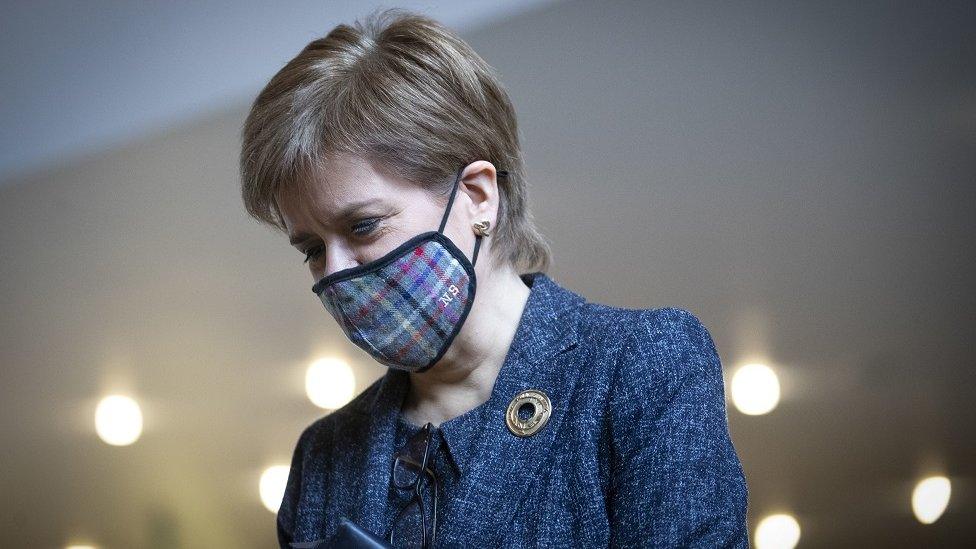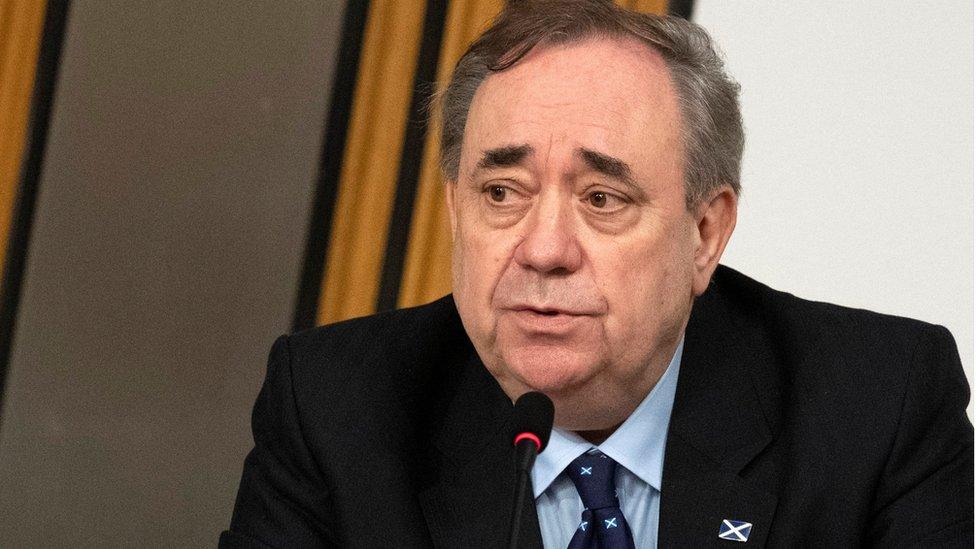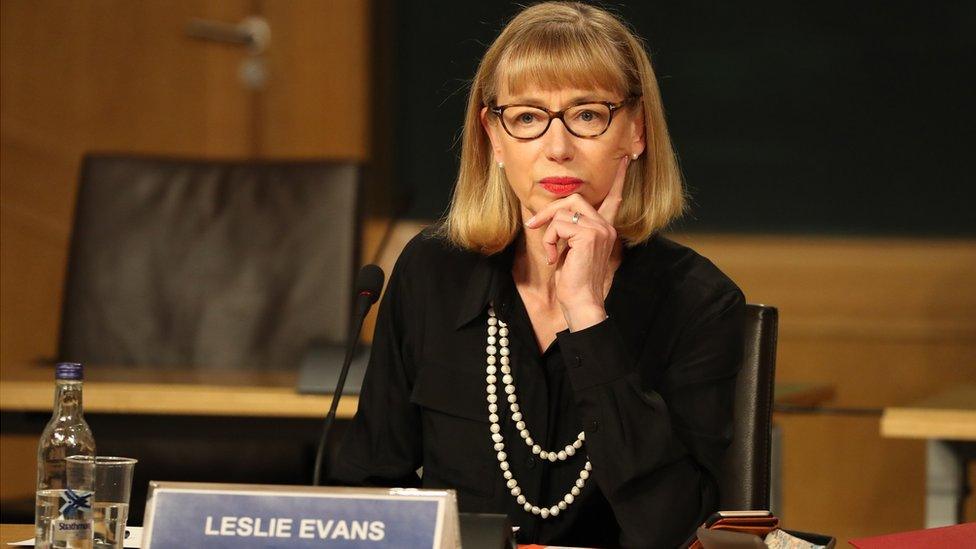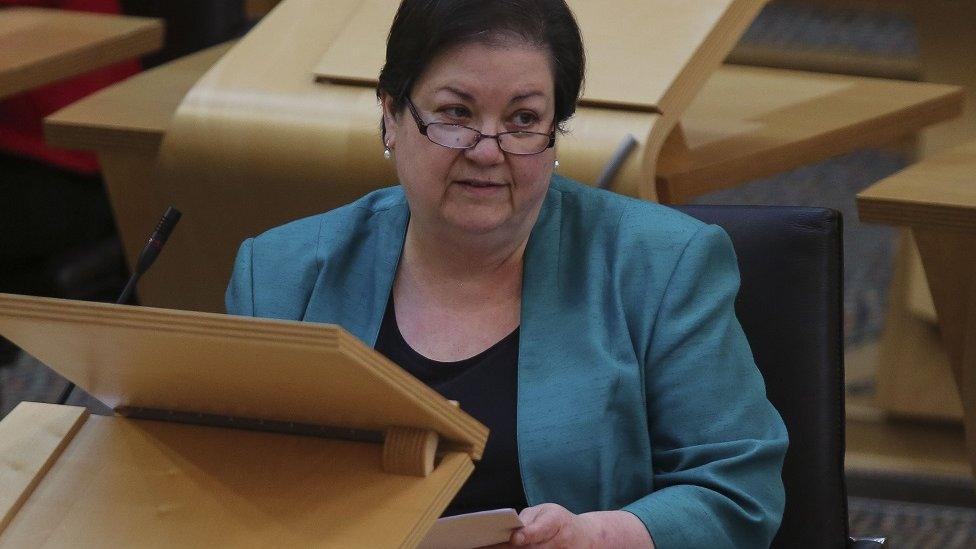The seven key questions Nicola Sturgeon faced
- Published

Scotland's first minister gave evidence to a Holyrood inquiry looking into her government's 2018 harassment investigation of Alex Salmond. It was found to be unlawful by a court in a process which cost the taxpayer hundreds of thousands of pounds.
Mr Salmond - and others - have made a number of allegations against the government and against Nicola Sturgeon herself. So, what were the key questions, and how did she answer them?
1. Did she break the ministerial code?
This was the most serious allegation for Ms Sturgeon. Mr Salmond had said he believed Ms Sturgeon definitely broke the code. Her political opponents say if she did, she would have to quit.
The allegations focus on when she found out about the Scottish government investigation into Mr Salmond. She initially claimed it was 2 April 2018, but since then another meeting on 29 March, when it's claimed she was told the details, has emerged.
This isn't just a matter of a few days. If Ms Sturgeon knew what the second meeting was about, she would have known it was government business and she should have reported it to civil servants at the time. That didn't happen.
Mr Salmond has said Ms Sturgeon is guilty of several breaches of the code in relation to these meetings.
What did Nicola Sturgeon say?
She told the committee that the fact that she did not remember the 29 meeting had been the subject of comment and scepticism and she wished her memory of it was "more vivid".
The first minister said she recalled that it may have been indicated "in general terms" there was a harassment issue but the purpose of the meeting was to arrange for her to see Mr Salmond himself.
Ms Sturgeon said that what she heard on 2 April in the dining room of her home was so significant that it may have "obliterated" what came before. She said Mr Salmond's account to her of his "deeply inappropriate behaviour" is a "moment in my life that I will never forget".
The first minister said she did not record the meeting with Alex Salmond on 2 April immediately because she did not want to compromise the independence or the confidentiality of the process.
Ms Sturgeon said the terms of the procedure excluded her from any investigation into a former minister and she should not even have known an investigation was under way. In her view, any undue influence on the procedure would have been more likely to arise if those conducting the investigation had been informed that she knew about it.
2. Was there a plot against Alex Salmond?

Mr Salmond believes there was a malicious and concerted plot against him from several people close to Nicola Sturgeon - including her husband, who is the SNP's chief executive, and her Scottish government chief of staff.
The evidence, Mr Salmond has claimed, shows there was a deliberate effort to damage his reputation "even to the extent of having me imprisoned". Much of this evidence Mr Salmond refers to, however, has not yet been published, so we don't know for sure how strong it is.
But he told the committee last week he had been given a memory stick in the run-up to his criminal case, where he was cleared of all charges. Mr Salmond claims it shows senior allies of Ms Sturgeon "pressurising police". He also alleges there was "construction of evidence" and "collusion of witnesses".
What did Nicola Sturgeon say?
Ms Sturgeon said the suggestion that anyone acted with malice or as part of a plot against Alex Salmond was "absurd".
She argued there was "not a shred of evidence" to support Mr Salmond's claims and she had "no motive, intention, (or) desire" to conspire against him. Ms Sturgeon said text messages between leading SNP figures - including her husband - were not evidence of a plot.
She said they had been taken out of context and were "not as presented".
3. Has there been a cover up?
The Scottish government has been criticised for failing to provide all the documents the committee asked for. On Tuesday, legal advice was made available under the threat of a confidence vote against Ms Sturgeon's deputy, John Swinney.
Another question is why the documents Mr Salmond believes show a conspiracy were not published earlier.
The straight answer is that they were provided to him for his legal case - which means they can't be used for any other reason. But the committee now has them after compelling the Crown Office to hand them over.
There was a colossal row last week when part of Mr Salmond's evidence to the committee was taken down from the parliament's website. It contained some of the most damning allegations against Ms Sturgeon and claims she misled parliament.
Parts of the document were withdrawn after the Crown Office - Scotland's prosecution service - said extracts were in contempt of court and could identify Mr Salmond's accusers.
Mr Salmond has claimed the lines between the government and Crown Office have become blurred - something the Lord Advocate has said is untrue.
What did Nicola Sturgeon say?
Ms Sturgeon said it had been a complex matter and the government had provided information in a proper way. The first minister says, for different reasons, she shared a lot of the frustration.
She said when information is not provided there is "a lot of mystique and intrigue" built up, which proves not to be the case when it is released. Ms Sturgeon said many of the things said about the legal advice proved not to be true.
4. Has Scotland's leadership failed?

Alex Salmond wants resignations. He has said the government's Permanent Secretary Leslie Evans should resign and that the head of the Crown Office - the Lord Advocate, James Wolffe - should be considering his position.
Mr Salmond argued Scotland's institutions hadn't failed - but their leadership had in this case.
He even left the door open to Ms Sturgeon having to resign herself - saying it was for others to judge if she should quit.
That's a damning conclusion from the man who led the Scottish government for seven years.
Ms Sturgeon will be asked if he's wrong - and is likely to mount a passionate defence of her government.
She has also made clear she is sticking by her permanent secretary and the Lord Advocate - as well as the others who Mr Salmond has said should be thinking about their position.
What did Nicola Sturgeon say?
The first minister said there were serious mistakes made by the civil service.
"But the civil service in Scotland acts properly and impartially at all time," she said.
Ms Sturgeon said attacks on the civil service and the prosecution service were unfair and deeply unfounded. She said there had been an attack on "the very fundamentals of our democracy", which she finds "deeply distressing".
5. What went so wrong with the harassment policy?
This is a big part of the committee's remit. They are trying to find out what led to the introduction of a policy which Mr Salmond successfully challenged in court.
It's been argued the policy was introduced too quickly and failed everyone involved; Mr Salmond and those who accused him of harassment.
It's widely accepted this was a big mistake from the government.
What did Nicola Sturgeon say?
The first minister said organisations all over the world were reviewing their policies at that time due to the #metoo movement.
Ms Sturgeon said gaps and weaknesses in the existing policies were identified and they were keen to address them quickly but they did not cut corners. She said the harassment policy had not failed but it had not been properly followed in Alex Salmond's case.
The Scottish government conceded the judicial review on the ground that their had been "prior contact" between the independent investigating officer and those who had made harassment complaints.
6. Did the government waste taxpayer money?
The Scottish government initially defended the harassment policy in the face of Mr Salmond's legal challenge.
On Tuesday night it finally published its legal advice, external, which shows concerns were raised by the senior counsel - an external legal adviser - in October 2018.
In December, external lawyers said the least worst option would be to admit defeat. The case wasn't conceded until January 2019.
This has raised questions over whether the government should have made that decision earlier - and potentially saved a lot of money in the process.
What did Nicola Sturgeon say?
Ms Sturgeon said that every time a government defends a legal action it is risking public funds. She also insisted the government had not prolonged its defence of the investigation and had acted in accordance with the views of the law officers.
Ms Sturgeon said that on 11 December the law officers' view was there was no question or need to drop the case. But she agreed the note on the 19 December was "catastrophic" and led to the ultimate concession.
The first minister insisted she was acting in accordance with the views of the law officers.
7. Did her government leak sensitive information?

Jackie Baillie will want to know more about claims of a breach of confidentiality
Mr Salmond claimed in his evidence that the name of one of the complainants was revealed during the government investigation.
On Tuesday night, that claim was backed up by two witnesses. Revealing the name would be a significant breach of confidentiality.
What did Nicola Sturgeon say?
Replying to the claim that a senior member of Ms Sturgeon's team revealed the name of the complainant to Mr Salmond's former chief of staff, the first minister said: "I am not accepting that that happened."
She said her assumption was Mr Salmond had previously apologised to one of the women and may have worked out another's identity "through his own investigations".
Challenged about details of the investigation being leaked to the Daily Record newspaper in 2018 - the first public confirmation of allegations against Mr Salmond - Ms Sturgeon said it "didn't come from me, or anyone acting on my instruction or request".